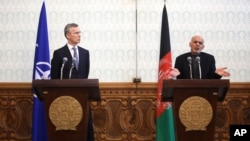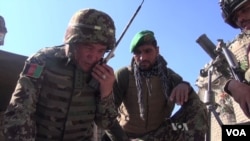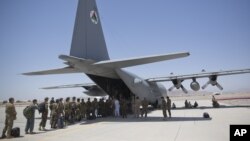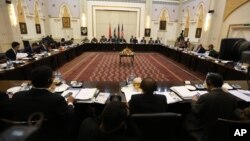Afghan President Ashraf Ghani says his security forces’ improved capabilities have enabled them to disperse Islamic State (IS) loyalists and deter the Taliban from threatening security, particularly in northern Afghanistan in the spring fighting season.
“I can confidently say that in Nangarhar, Daesh (Arabic acronym for IS) is on the run. It is running for cover,” Ghani told reporters in Kabul Tuesday.
The eastern Afghan province of Nangarhar is where IS militants have tried to establish strongholds for spreading extremist ideology to the rest of the conflict-torn country. The Middle Eastern terror group has designated Afghanistan, Pakistan and parts of Iran as its Khorasan province.
Afghan officials insist militants claiming loyalty to IS are composed of former Taliban fighters, including those fighting the state in neighboring Pakistan.
“I promised the people of Nangarhar that there will be no quarter given to Daesh and none has been given. We have combined close air support with massive ground operations, but particularly with people’s support. Seven hundred and fifty people who had retired from our commando units in one day joined and formed one of the crack divisions that now has Daesh on the run,” Ghani said while speaking at a news conference with NATO Secretary General Jens Stoltenberg who is on a two-day visit to Kabul.
Praises from NATO
Stoltenberg praised gains Afghan security forces have made against the armed opposition in recent months and reiterated NATO’s financial and training assistance to Afghans; but, he dismissed suggestions that NATO would return to its combat role in Afghanistan if the resurgent Taliban threatens the country’s national security.
The U.S.-led international military alliance ended its combat mission in December 2014 and its current force of nearly 13,000 troops is only engaged in training, advising and assisting the Afghan army and police.
“We will have, of course, assessments, we will analyze the challenges and always be open to how we can adjust but it is going to be based on a non-combat mission.... We will not go back to a combat operation,” Stoltenberg added.
A United Nations report has also acknowledged recent Afghan security operations backed by international military airstrikes, as well as attacks from the Taliban, led to the concentration of IS in remote locations in Nangarhar near the border with Pakistan.
The report due to be discussed Tuesday at the Security Council highlights challenges facing the sustainability of Afghan forces.
“Critical shortcomings continue to hamper the forces in effectively addressing the threat posed by anti-government elements, including insufficient recruitment, high attrition rates and insufficient logistics and planning, and air support and coordination.”
President Ghani asserted that since the beginning of the year, Afghan forces have improved security around Kabul and in northern regions, clearing them of insurgents, including the key Baghlan province. The operations, he added, have enabled security forces to prevent the Taliban from turning the region into a center for its spring attacks.
Call for talks
Ghani also repeated his call for the anti-government forces to end violence and engage in reconciliation talks with the government. Without naming neighboring Pakistan, where Taliban leaders are believed to be sheltering, Ghani urged regional countries to help in the Afghan peace efforts.
“I want to repeat, combat is not a goal in itself, stability is, peace is, prosperity is. So, we invite those states and non-state actors that are sustaining the conflict to see the logic of peace. Sponsoring non-state actors by states will boomerang as it has in the past,” Ghani said.
Peace talks between the Taliban and Afghan government officials were due to be held in Pakistan earlier this month but the insurgent group refused to attend the meeting, citing certain preconditions.
The move has fueled concerns Afghanistan will see more violence this year, after a bloody 2015 in which security forces suffered unprecedented casualties and nearly 3,500 civilians were killed. Moreover, the fighting allowed the Taliban to control more territory than at any time since it was pushed from power in 2001.
President Ghani insists it is too early to conclude his peace initiative has failed, saying such efforts require “strategic patience.”







